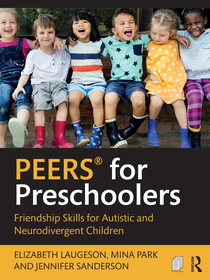
PEERS® for Preschoolers
Friendship Skills for Autistic and Neurodivergent Children
-
10% KEDVEZMÉNY?
- A kedvezmény csak az 'Értesítés a kedvenc témákról' hírlevelünk címzettjeinek rendeléseire érvényes.
- Kiadói listaár GBP 57.99
-
27 704 Ft (26 385 Ft + 5% áfa)
Az ár azért becsült, mert a rendelés pillanatában nem lehet pontosan tudni, hogy a beérkezéskor milyen lesz a forint árfolyama az adott termék eredeti devizájához képest. Ha a forint romlana, kissé többet, ha javulna, kissé kevesebbet kell majd fizetnie.
- Kedvezmény(ek) 10% (cc. 2 770 Ft off)
- Kedvezményes ár 24 934 Ft (23 747 Ft + 5% áfa)
Iratkozzon fel most és részesüljön kedvezőbb árainkból!
Feliratkozom
27 704 Ft

Beszerezhetőség
Becsült beszerzési idő: A Prosperónál jelenleg nincsen raktáron, de a kiadónál igen. Beszerzés kb. 3-5 hét..
A Prosperónál jelenleg nincsen raktáron.
Why don't you give exact delivery time?
A beszerzés időigényét az eddigi tapasztalatokra alapozva adjuk meg. Azért becsült, mert a terméket külföldről hozzuk be, így a kiadó kiszolgálásának pillanatnyi gyorsaságától is függ. A megadottnál gyorsabb és lassabb szállítás is elképzelhető, de mindent megteszünk, hogy Ön a lehető leghamarabb jusson hozzá a termékhez.
A termék adatai:
- Kiadás sorszáma 1
- Kiadó Routledge
- Megjelenés dátuma 2025. január 14.
- ISBN 9781032801391
- Kötéstípus Puhakötés
- Terjedelem686 oldal
- Méret 280x210 mm
- Súly 1270 g
- Nyelv angol
- Illusztrációk 30 Tables, black & white 739
Kategóriák
Rövid leírás:
This manual builds on the success of the PEERS®, an internationally renowned program used in over 150 countries and translated into numerous languages, now expanded to work with autistic and neurodivergent preschool-aged children, and those with other social challenges.
TöbbHosszú leírás:
This manual builds on the success of the Program for the Education and Enrichment of Relational Skills (PEERS®), an internationally renowned program used in over 150 countries and translated into numerous languages. PEERS® has now expanded to work with autistic and neurodivergent preschool-aged children, as well as those with other social challenges. Through this new manual, providers will learn about important skills to enhance positive peer interactions and friendship development for young children, how to structure sessions and encourage skill-building effectively, and how to educate and empower parents to be valuable social coaches for their children. Every chapter includes a therapist guide for each session and parent resources such as lessons, homework, handouts, worksheets, and social coaching play cards. This latest edition to the PEERS® program is ideal for professionals and educators who provide social-emotional therapeutic services and support to young children (between the ages of four to six years) diagnosed with autism or other social challenges.
“The PEERS® program has been a gift to autistic and other neurodivergent teens and adults, their families and professionals who work with them by providing a fun, innovative way of building social skills and opportunities for interaction. This version for preschool children provides a modified version of its step by step, evidence-based, positive approach to how to support younger children in social relationships. It will bring joy, confidence and skills to many children, their parents (who are actively involved from the word go) and the providers who get to work with them.”
Catherine Lord, PhD, Distinguished Professor of Psychiatry, Semel Institute of Neuroscience and Human Behavior, UCLA David Geffen School of Medicine
“A marvelous addition to our tools for developing social-communication skills in preschoolers this valuable, evidence based program teaches social skills using lessons, play based materials, and group activities. Designed to have materials that are readily taught and used, this book will be an invaluable guide to foster social skills in the preschool population.”
Fred R. Volkmar, MD, Irving B. Harris Professor Emeritus, Child Study Center, Yale University School of Medicine
TöbbTartalomjegyzék:
Chapter 1 Introduction
Chapter 2 Session 1: Listening and Following Directions
Chapter 3 Session 2: Meeting and Greeting Friends
Chapter 4 Session 3: Sharing and Giving a Turn
Chapter 5 Session 4: Asking for a Turn
Chapter 6 Session 5: Keeping Cool
Chapter 7 Session 6: Being a Good Sport
Chapter 8 Session 7: Show and Tell During Play
Chapter 9 Session 8: Don’t be Bossy
Chapter 10 Session 9: Asking a Friend to Play
Chapter 11 Session 10: Joining a Game
Chapter 12 Session 11: Asking to Play Something Different
Chapter 13 Session 12: Asking and Giving Help
Chapter 14 Session 13: Body Boundaries
Chapter 15 Session 14: Using an Inside Voice
Chapter 16 Session 15: Review Part I
Chapter 17 Session 16: Review Part II and Graduation
Több




